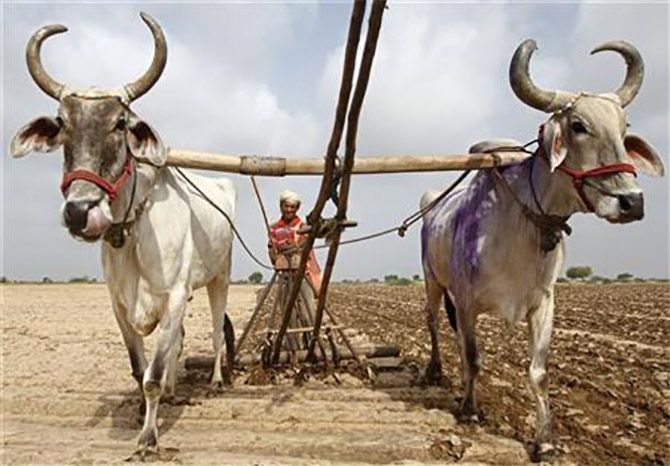 | « Back to article | Print this article |

Allocation boost likely for schemes on agriculture, irrigation, rural roads
In a move to boost rural consumption and alleviate distress in the hinterland, the government is likely to give an allocation push in Budget 2016 to programmes on irrigation, rural roads, soil health cards and agriculture.
According to officials, the Union Budget for 2016-17 could see a significant increase in allocation to marquee programmes like the Pradhan Mantri Krishi Sinchai Yojana, Rashtriya Krishi Vikas Yojana, Pradhan Mantri Gram Sadak Yojana, and the one to provide soil health cards to the country’s 140 million farmer families over three years.
The increase is likely to be over the allocations in 2015-16 (according to the revised estimates).
The idea, it appears, is not only providing a one-time solution to the rural problem but boosting the overall rural economy, which has been reeling from the impact of consecutive droughts, through increased public spending.
Meanwhile, agricultural experts are meeting finance ministry officials on Monday to give their inputs on the Budget.
“The agriculture sector has seen a slowdown over the past three years. To revive it, a ‘Make In India’ -like stimulus is needed,” S Mahendra Dev, director, Indira Gandhi Institute of Development Research, told Business Standard.
Though the 14th finance commission had given a higher devolution to states for spending on agriculture and irrigation infrastructure, it was still too early for them to pick up the reins, Dev said.
“The Centre needs to continue spending more on agriculture because states will take time coming to terms with the finance commission windfall.”
The Union Budget for 2016-17 plans to do just that.
Allocation to the Pradhan Mantri Gram Sadak Yojana could be maintained at the Rs 15,100 crore (Rs 151 billion) sanctioned for 2015-16 or enhanced with a definite objective of connecting over 178,000 rural habitations with all-weather roads by March 2019 -- three years ahead of scheduled completion -- say officials.
State governments, along with the Union rural development ministry, are already preparing a time-bound action plan for this.
The ambitious soil health card scheme could be merged into the Rashtriya Krishi Vikas Yojana, and the latter’s allocation could be enhanced.
Of the Rs 568 crore (Rs 5.68 billion) the Centre had allocated to the soil health card scheme in the 2015-16 Budget, Rs 109 crore (Rs 1.09 billion) had been released to states as of December 31, 2015.
A merger will mean that states will have more flexibility to spend the funds allocated to them and ensure better focus on implementation.
Compared with Rs 4,500 crore (Rs 45 billion) in Budget 2015-16, the total central allocation to RKVY could increase to Rs 10,000 crore (Rs 100 billion) in the Budget for 2016-17.
The 2015-16 allocation, however, was before the implementation of the Shivraj Singh panel recommendations for revamping centrally sponsored schemes.
“The soil health card scheme will be ramped up, as the prime minister has already laid out plans for it.
It will be merged into Krishi Vikas Yojana, one of the government’s flagship schemes,” said a senior official.
The Centre would ensure, said the official, that states contributed their share of funds to the programmes and that their own portion was substantially higher as well.
An ambitious crop insurance scheme with premiums as low as two per cent of the sum insured for the farmers is expected to be announced next week.
The scheme, Bharatiya Krishi Bima Yojana, is estimated to cost the government Rs 2,500 crore (Rs 25 billion) to Rs 3,000 crore (Rs 30 billion) a year.
For food, officials said, the focus would be on faster completion of digitisation and modernisation of the operations of the public distribution system to curb leakages.
The Pradhan Mantri Krishi Sinchai Yojana could also see a significant increase in allocation in the 2016-17 Budget, thanks to Prime Minister Narendra Modi’s personal commitment to improving irrigation infrastructure in the country.
In the 2015-16 Budget, Rs 5,300 crore (Rs 53 billion) had been sanctioned to the programme.
The Centre plans to spend Rs 50,000 crore under PMKSY in the five years starting 2015-16.
To meet the target, it will have to allocate about Rs 12,000 crore (Rs 120 billion) in each of the next four financial years.
PMKSY combines the three existing central government schemes -- the water resources ministry’s Accelerated Irrigation Benefit Programme, the rural development ministry’s Integrated Watershed Management Programme, and the on-farm water management component of the agriculture department’s National Mission on Sustainable Agriculture.
Officials said the programme’s focus in 2016-17 would be on rebuilding and improving the existing infrastructure, such as canals and bunds, before building new ones.
The NITI Aayog will be the nodal body for coordination between the Centre and states on major irrigation initiatives, and among different central ministries.
“The government should focus more on the agriculture and rural sector, as its condition is not good; it should not be ignored any further,” said T Haque, a former chairman of the Commission for Agriculture Costs and Prices.
BHARAT TO TAKE CENTRE STAGE
SET FOR A BOOST
Image: A farmer ploughs his field to sow millet seeds. Photograph: Amit Dave/Reuters